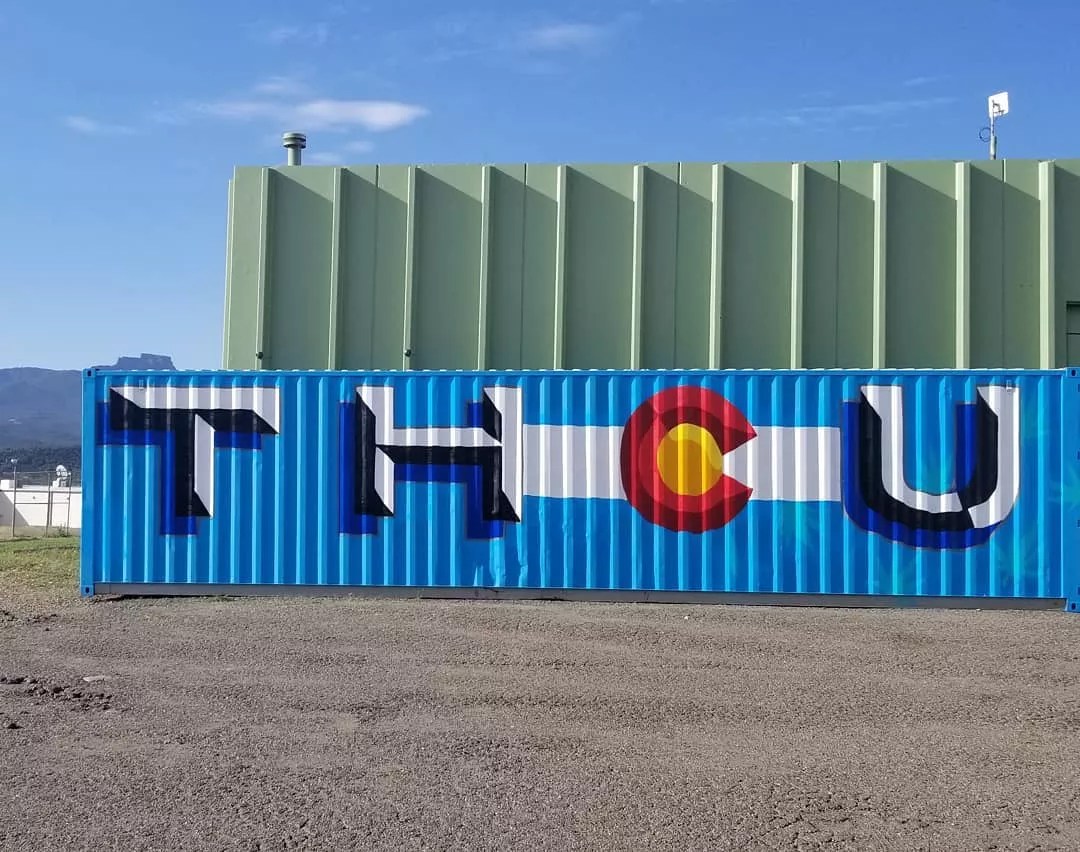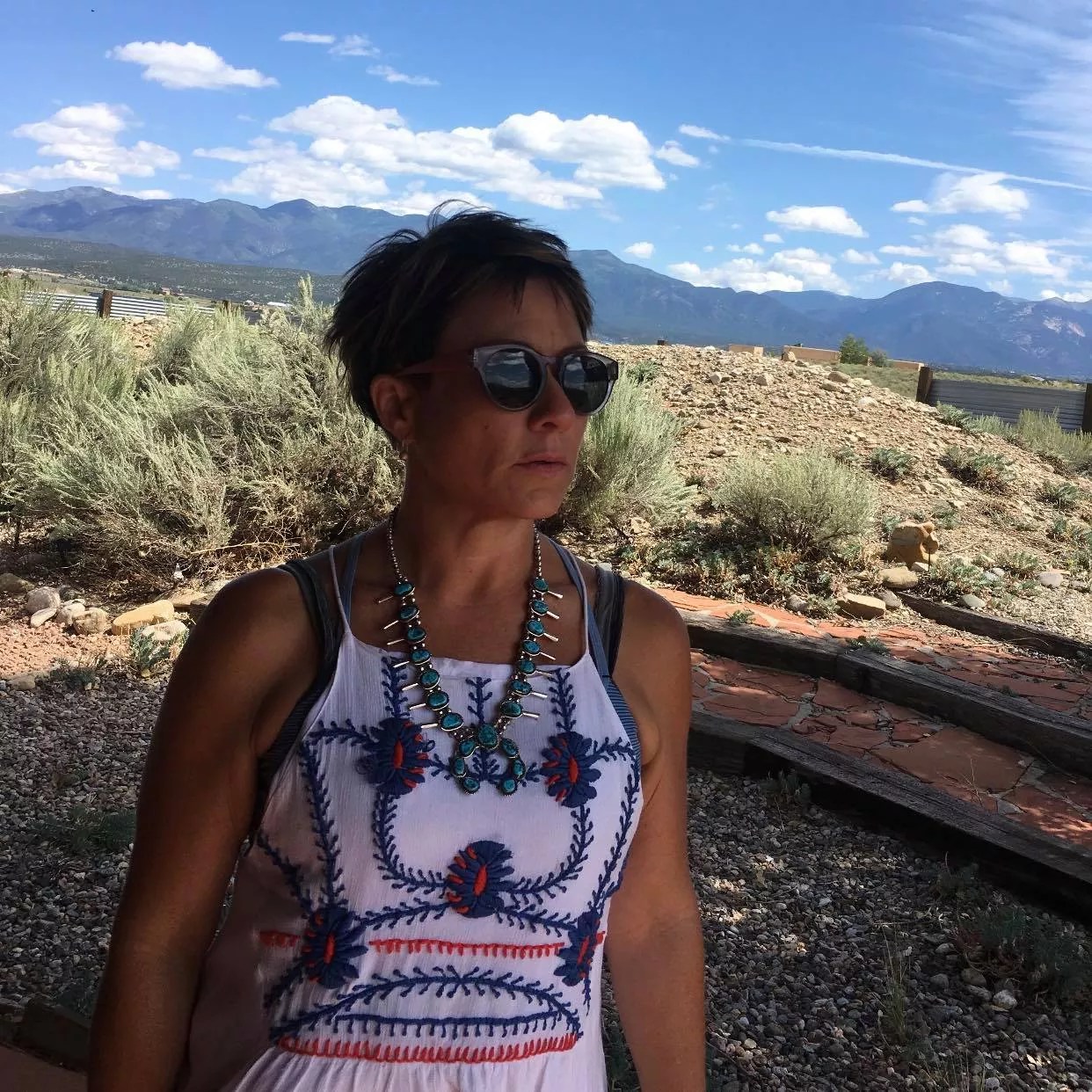
Courtesy of Kimberly Schultz

Audio By Carbonatix
Denver may be Colorado’s cannabis capital, but Trinidad is the state’s pound-for-pound champion. The border town of just over 8,000 people is home to 25 dispensaries and sees plenty of consumers coming north from New Mexico and nearby Texas. But while the town is a shopper’s mecca, most of Trinidad’s cannabis-buying visitors don’t have anywhere to smoke it, since social use is still banned at local businesses.
But that could change, with the Trinidad City Council now accepting public input on whether it should create marijuana hospitality licenses for dispensaries, hotels and other establishments. Kimberly Schultz, one of Trinidad’s first dispensary owners, has plenty to say; she believes that adding social use would keep the town’s cannabis tourists – and their money – around a little longer.
We recently caught up with Schultz, co-owner of Trinidad’s Higher Calling U, to learn more about the past, present and future of legal weed in the town.
Westword: Were you in Trinidad when the cannabis boom began?
Kimberly Schultz: We actually opened the first store in Trinidad within a couple of weeks [of legalization], and it was so crazy here at the border. We’re a mom-and-pop store, so we scrounged up everything we could and rounded up some partners, and purchased an old warehouse that had been vacant for years. I was in the Chamber of Commerce until 2012, and we always sat around the economic development table trying to figure out how to keep jobs and our youth here, and how to bring tourism back to the level it was at one point. Then marijuana came to town, and a lot of those questions were answered between the manufacturing, jobs and tourism that were brought along with it.
How much has the cannabis landscape changed in Trinidad over the past six years? There are 25 dispensaries there now, correct?
We’ve gone from a handful of dispensaries at first to 25 currently. What that has essentially done is make us an attraction, like a food court and outlet shopping scenario, where there are a lot of things to see. It really is a tourism beast, and people are coming from all over the world to experience and purchase Colorado’s legal marijuana. We have some of the best cannabis in the world because of the testing and mandates.
I had no idea when I got into it that the wellness factor would be so huge. People are ready for something different in their health care. I was thinking my customers would be about rock and roll, recreational weed and partying on, but ultimately my median age of shopper became sixty years old. They want to know about cannabis, and a lot of these folks are new consumers or haven’t had anything since their college days.
Do you think 25 stores is too many for a small town like Trinidad?
It’s a double-edged sword, because the more that are here, the more people come. I really feel that way, because we’re not just a spot in the road anymore. But when we initially bought into this process, we were told it’d be five dispensaries, then it went to thirteen, then it went to twenty, and so on. We just kind of rolled with it. With those stores, I feel more consumers came to the area, and we really hit on something.
This isn’t against anyone in particular, but I don’t like the perception of some of the stores downtown that are so close together, because the traffic is really aware of who’s shopping there. I think the perception of that was kind of distasteful to some locals. We’re on the interstate and don’t have anyone around us. We work really hard to be credible and good businesspeople, but perception is everything. We’re kind of all lumped into one basket as far as being the same businesses, but we’re not. A lot of dispensaries in Trinidad are Denver storefronts – the LivWells, the Native Roots, the Strawberry Fields, etc. – and they have no connection to the community, except for some of the locals who might work there. We don’t necessarily see them making donations or helping the community to the extent of local [business owners] like ourselves.

Trinidad dispensary owner Kimberly Schultz wants to bring marijuana hospitality to her town.
Courtesy of Kimberly Schultz
What do you think marijuana has done for Trinidad? Has the tax revenue and economic impact been worth the new traffic and perception?
Cannabis coming to town got us out of the economic slump we were in. The economy busted in 2008 and 2009, and we also saw a boom-bust cycle with our natural gas industry. The attrition of families leaving the area, businesses going under, foreclosures – they were decimating our economy, with no end in sight. We were holding onto our rear ends, not knowing what the next business moves were. When we were able to open these shops, we saw a dramatic increase in tax revenue coming into the community, we saw people become employed, and that was our main goal. People are working, and we saw this tremendous real estate grab when this all occurred.
There were literally people on the corner speculating on properties, because we had so many vacant, empty historical buildings. In 2010, the back-of-the-envelope estimates to bring those buildings up to code was $220 million, so we didn’t really have a plan on how to manage this inventory of historical buildings. We immediately saw an impact on the local economy [from cannabis], and I don’t think anyone could’ve projected how well it went. We had some big players come into the community, purchase property, take stakes and start developing. We’ve been able to move forward more so than a lot of rural communities of our size, and that makes me very proud. From 2003 to the end of 2012, it was so hard to do business here – and it still is, but the economy was held up by the natural-resources industry back then, and when it busted, there was nothing to fall back on
Is there an expiration date to this? Are there worries of becoming a cannabis ghost town as more states, including New Mexico, consider recreational legalization?
I think it’s going to continue if we diversify what we’re doing. Just having storefronts on a corner isn’t necessarily a recipe for continued business. We need to be in a position to capitalize, and that comes full circle to keeping people in town.
Is hospitality a part of that diversification?
So we’re still kind of in a situation where people know Trinidad for our central location: to stop and buy gas, maybe some food, and now maybe some cannabis, but they’re getting back on the road. There are no reasons to stay. I have these conversations with my customers every day, where I have to essentially tell them that they’ve purchased legal cannabis and paid high taxes to do so, but they still have to treat it like they always have. It’s legal, yet still like a black-market situation, because we’re setting these customers up to fail.
We have a duty to make sure that people are safe. I see a lot of people from the Panhandle states coming through town, and they come from low altitude. They come to Trinidad’s high altitude, and then they purchase high-potency flower or edibles that they might not have back home. That can be bad, because they’re not in a position where anyone can show them how to consume these products. It’s a very precarious situation, and I think they should be able to purchase products and have somewhere safe to consume and stay – and enjoy themselves around town, eat at our restaurants, enjoy our galleries and spend money at our businesses. Airbnbs are doing the best right now, because they can do whatever they want in their private homes. A couple of economy motels here will let visitors smoke, but not everyone is an economy motel person. If people had options, they’d enjoy themselves here, spend their money and come back.
As a border town with people driving in from different states and cities to buy cannabis, how do you think traveling should be handled if social cannabis use were allowed in Trinidad? That’s a lot of cannabis-consuming visitors with cars.
If you’re in this sort of business, whether it’s alcohol or cannabis consumption, as a business owner you have to make sure people are safe and don’t over-consume. We have safe rides in town, and we’ll make sure people get from A to B. But the other side of that coin is the restaurants and bars: Those businesses aren’t in a position where they have to get every visitor home. That being said, I think we need to be smart and put some safeguards in place for that. If the city council would let some of these hotels and other businesses allow it, too, it’d be even better, because then people wouldn’t have to travel.
Right now, we’re putting people in that position on the road every day, telling them, “Here’s your cannabis, get on the road, and treat it like you always have. You can’t smoke in your hotel, in public, at the park, and the lake, and that’s it.” There has got to be a happy medium here.